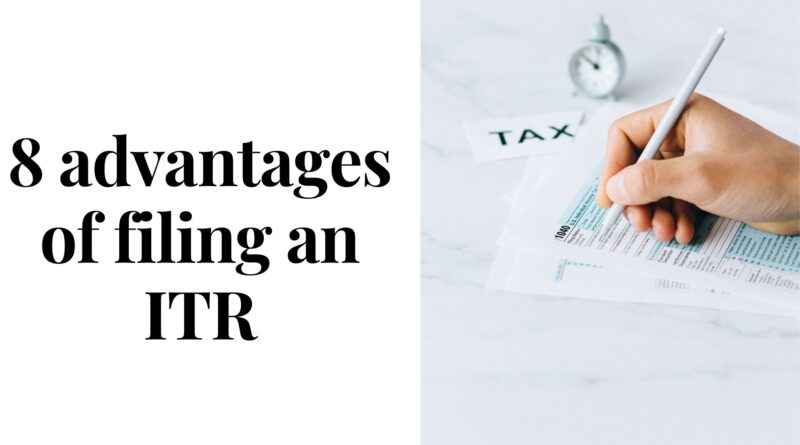8 advantages of filing an Income Tax Return
Many investors don’t file their income tax returns since they have very little or no tax burden. Then there are investors who put off filing their returns for years, only to go to a CA and file them when an urgent situation arises that calls for their most recent ITRs.
I’ll explain to you today why you should still file your income tax return even if your income is below the taxable threshold.
Before that, I’d like to explain ITR in more detail for those who are unfamiliar.
Who is required to file an Income Tax Return (ITR)?
A taxpayer must file an income tax return in order to report their income, claim any applicable deductions and exemptions, and pay any taxes due on their taxable income.
Everyone who earns money should file an ITR as a responsible Indian citizen since, in doing so, we truly declare all sources of income, whether they are taxable or not.
If a person’s gross total income (before allowing deductions under sections 80C to 80U) exceeds Rs. 250,000 in a financial year, they are required by the Income Tax Department to file an income tax return.
One may also submit it even if their income is zero (in which case it is known as a NIL return) or less than the taxable limit. It will serve as evidence that you have money in your bank accounts or other investments if you file a Nil return.
Benefits of ITR
Regardless of income, there are numerous benefits to filing an ITR. I’ve outlined a few advantages of filing an ITR below.
Evidence of the total earnings across the years
It is possible for someone to earn a tiny amount of money over time that is below the tax threshold and build up a sizable corpus. After a few years, it is possible that they will be subject to tax audits for unknown reasons.
It will be a drawn-out and tiresome process to explain the sources of revenue over the years if someone has not submitted the ITR. ITR, however, will serve as official documentation of revenue generated each year.
processing of VISA
Proof of income is necessary if you are travelling abroad or have immediate plans to do so. If you are salaried, the employer certificate will suffice, but if you are self-employed, you must provide proof of your income. ITR returns will therefore serve as evidence of income.
For self-employed people, ITR acts as verification of income.
Being self-employed prevents you from having proof of income, such as a form 16 and an employer’s salary certificate. The most practical proof of income is therefore an ITR that you have on hand.
Carry forward capital losses are possible.
The Income Tax Act permits you to offset past losses against future gains and income for a period of eight consecutive years if you have incurred capital losses.
The Income Tax Department has established that losses for a year cannot be carried forward unless the return for that year has been lodged on time. Therefore, file your return before the due date to disclose the capital loss sustained, even though it is a loss return and you have no income to report.
Beneficial for individuals with extremely low incomes
Many people receive meagre salaries, including
- On bank or corporate deposits, interest
- Dividends
- Family allowance
- Agricultural income, tax-free bonds, and other types of exempt income.
These individuals’ combined income may be below the taxable threshold, and they may believe that they are not required to submit any tax returns since they owe no taxes. However, they will receive official income verification by completing an ITR.
Requesting a tax refund
You can apply for a refund from the income tax department if you overpaid your tax on your income. You must file an ITR in order to receive this refund.
The feeling of receiving a tax return is similar to receiving a payroll credit. Many salaried individuals fail to complete their ITR because they believe that form 16 and the tax on their income has already been taken out of their pay. However, it is possible that the employer overpaid taxes without taking into account your actual housing rent, tax-saving investments, or insurances. In that situation, filing an ITR will prompt you to approach the IT department for a refund.
Loans are easily obtained.
ITRs for the previous two to three years are required documentation if you apply for any loans, such as a home loan, auto loan, etc. ITR is a crucial document that will assist your lender in determining your ability to repay. Many persons who have not submitted their ITRs on time scramble to do so at the last minute.
Acquiring high life insurance
The insurance company requests proof of income when you get higher life insurance coverage in order to determine how much coverage will be supplied to you. Bank statements or ITRs from the last three consecutive assessment years are needed for this salary slip.
Bank statements will also not be a reliable source of evidence because it is possible that you won’t receive a wage receipt or that several organisations are responsible for paying your monthly income. Therefore, it is better to file an ITR return.



